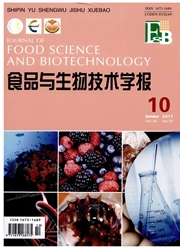

 中文摘要:
中文摘要:
从中国传统固态发酵食醋醋醅中分离出5株产细菌纤维素(BC)的菌株,经生理生化特征及16S rDNA序列分析,它们均属于中间葡糖醋杆菌(Gluconacetobacter intermedius),其中编号为1-17的菌株初始产量较高。应用扫描电镜技术(SEM)和傅里叶红外光谱技术(FT-IR)分析了BC结构特征。采用单因素研究了温度、培养时间、碳源、初始pH对BC合成的影响。确定菌株1-17最适温度为35℃,发酵时间为7d,甘油和葡萄糖为最适碳源,最适初始pH为6.0,乳酸根离子和钙离子能够促进BC的合成。通过培养条件优化使得细菌纤维素产量从初始的(3.90±0.08)g/L增加到(7.90±0.19)g/L。
 英文摘要:
英文摘要:
Five bacterial cellulose(BC) producing strains were isolated from solid-state fermentation cultures of traditional Chinese vinegar,and identified as Gluconacetobacter intermedius based on their physiological and biochemical characteristics as well as 16 S rDNA sequence analysis.Strain 1-17 could produce more BC then the others.Furthermore,surface features and chemical structure of BC were analyzed by scanning electron microscopy(SEM) and Fourier transform infrared(FT-IR) spectroscopy,respectively.Effects of temperature,time,carbon sources and initial pH on BC production were tested.The optimal temperature for strain 1-17 was 35 ℃,and the fermentation time was 7d.Glucose and glycerol were the optimal carbon sources,and the optimal initial pH was 6.0.Both lactate and calcium could promote the synthesis of BC.The yield of BC was improved from(3.90±0.08)g/L to(7.90±0.19)g/L under the optimal conditions.
 同期刊论文项目
同期刊论文项目
 同项目期刊论文
同项目期刊论文
 期刊信息
期刊信息
